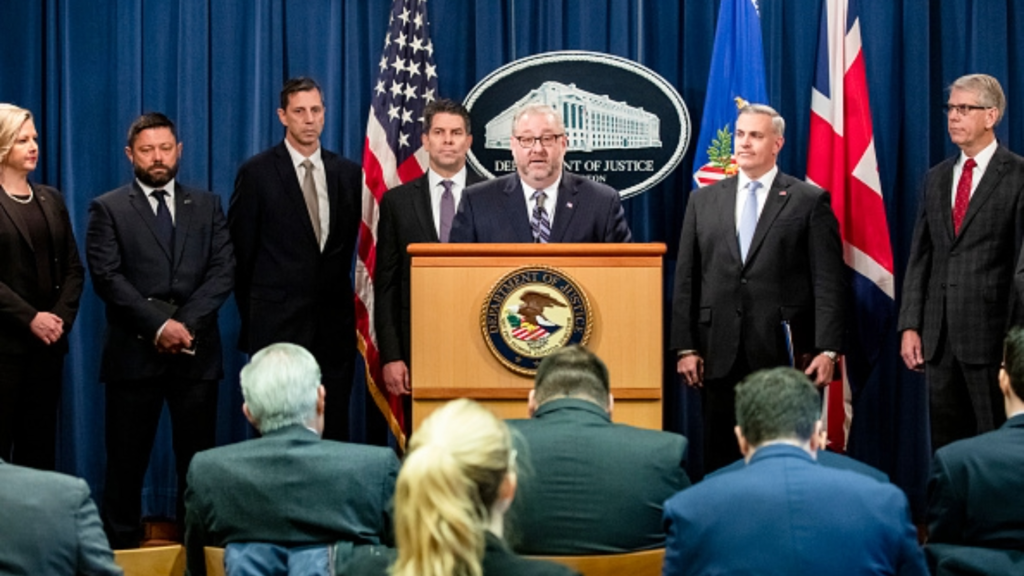Cybersecurity Crypto Experts Needed in Government: Rising Demand Across UK and US Job Boards

Cybersecurity job openings indicate a concerted effort by the UK and US governments to enhance their capability to tackle crypto-related crimes. Credit: Samuel Corum/ Getty Images
- Government job postings of cybersecurity-related roles are rising in the UK and US.
- These open job roles typically focused on cryptocurrency payments and investigations, suggest a lack of experts in governments.
- The private sector is also witnessing a rise in hiring initiatives prompted by increasingly sophisticated threats.
The pool of experts who have a deep understanding of cryptocurrency and want to work in government is small. Typically, these so-called experts in blockchain and cybersecurity have found their skills in unorthodox ways and often have no desire to work in a public financial setting.
And yet the demand for cybersecurity professionals with expertise in cryptocurrency can be seen in government job boards in the UK and the US, reflecting concerns over increasingly sophisticated cyber threats associated with emerging technologies.
The US and UK Crackdown on Crypto Crime
The UK’s recent legislative actions and strategic initiatives are part of a broader crackdown on crypto-related crimes. With the passage of a new bill last week, UK law enforcement agencies have expanded powers to seize and freeze cryptocurrency assets.
This tough stance on crypto crime is also taking place across the pond. The US federal government proposed a $12.72 billion budget for cybersecurity, an increase from last year.
While these two nations differ in specific regulatory approaches, there appears to be a broad consensus on strategies that focus on developing a deep bench of cybersecurity skills across the public sector. The push for a workforce that can navigate the complexities of modern cybersecurity threats and bolster national cybersecurity defenses, may also be indicative of a lack of government experts, and a rush to fill this gap quickly.
Closing the Skills Gap
Regulating cryptocurrency is no easy feat. However, with a lack of expertise in government, it seems an unfairly weighted task.
Given Bitcoin’s grassroots beginnings and guerilla associations, social media posts and Reddit threads abound in discussions about cryptocurrency regulation and who should be included in this process.
Some cryptocurrency advocates argue that crypto should be regulated by people who know how it works, those who use it – crypto investors, blockchain developers, and miners.
“If you want to regulate crypto, you should welcome people like Vitalik Buterin,” one Reddit user comments.
The UK’s initiatives to boost the cybersecurity sector seem to reflect this current lack, with the workforce growing by 10% in the past year, fueled by government initiatives and training programs designed to attract a diverse range of applicants from various backgrounds.
These efforts are part of a broader strategy to close the significant skills gap in the industry, where 50% of businesses report a basic cybersecurity skills shortage, and an additional 33% note an advanced skills shortage. The UK Government’s “Upskill in Cyber” program has received a record number of applications amid the country’s cyber skills shortage.
The growth in job postings in the US also reflects this urgency, with CyberSeek reporting more than 448,033 positions requiring cybersecurity skills advertised between September 2022 and August 2023.
Fraud Prevention, Tax, and Money Laundering
In September 2023 The UK’s National Crime Agency (NCA) announced it was looking to expand its capabilities to tackle cybercrime by setting up a new team specifically focused on cryptocurrency-related criminal activities. The since-closed position was part of six positions for specialist crypto investigators.
This aspect of cybersecurity, outlined in the NCA’s job posting, typically concentrates on the legal and financial frameworks of transactions and involves tracking and analyzing financial transactions to detect and prevent illegal activities like fraud, tax evasion, and money laundering. The specific focus here would, therefore, likely be tracing transactions on blockchains.
Current open positions in private companies also indicate a need for cybersecurity experts in the private sector. PayPal is hiring a cryptocurrency investigations specialist, while a Senior Crypto Threat Analyst role at Elliptic has opened up, focusing on identifying and monitoring crypto-asset use connected to terrorism and sanctions.
Such roles will likely focus on tracing and understanding complex crypto transactions that are often used for illicit activities, including money laundering and funding cyber attacks.
Cybercrime Experts Warn of Talent Moving Offshore
Richard Botley, cofounder of Day 6 Security and Blockwarp spoke to CCN about the transition of cryptocurrencies from an anti-establishment asset class to a mainstream financial sector, and the challenge of finding qualified professionals who understand both cybersecurity and crypto and are willing to work in government.
“The Venn diagram of people who truly understand cybersecurity and crypto who want to work for a government is very small.”
Botley warns that overly stringent regulations could drive talent offshore to more favorable markets, citing the recent incident where a security lapse at the SEC led to a fake Twitter post that temporarily influenced Bitcoin prices, highlighting the potentially drastic consequences of cybersecurity oversights.
Botley also points out the utility of existing cybersecurity standards like ISO 27001, which helps ensure that crypto firms maintain a baseline level of security to protect user assets and data. He suggests that such standards could be integrated into the criteria for issuing virtual asset management licenses. In the UK, for instance, the Financial Conduct Authority’s (FCA) Anti-Money Laundering and Counter-Terrorist Financing Cryptoasset Registration process mandates detailed cybersecurity plans.
Governments might soon set specific guidelines for smart contract audits, traditional penetration testing, and bug bounty programs to further secure crypto transactions and infrastructure.
A particularly concerning emerging threat is the use of AI-generated deepfakes in phishing and misinformation campaigns. Blockchain technology, according to Botley, could potentially help verify the authenticity of online content in response to these sophisticated threats.
Election Pressure Intensifies
In the run-up to global elections, cybercrime and the manipulation of AI-generated deepfakes in phishing and misinformation campaigns is a key focus point for governments.
With both the US and the UK facing elections in the Fall, lawmakers in the US and the UK face pressure to drive forward crypto regulation.
In the United States, Senators Cynthia Lummis and Kirsten Gillibrand proposed legislation aimed at regulating stablecoins on Wednesday, April 17. Meanwhile, Bim Afolami, the Economic Secretary to the Treasury, announced that the UK government is swiftly advancing its expected cryptocurrency legislation, aiming to present it before parliament adjourns for the summer break.

